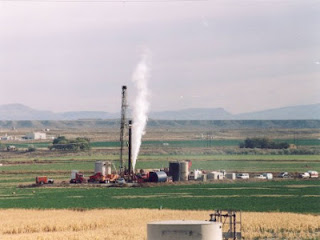Colleyville resident Kim Davis said on AlterNet.org “The tests confirmed our worst fears, while Colleyville ignored their own tests to let fracking continue. Apparently the city represents Titan and the gas industry instead of local residents.”
Colleyville City ordinances say: “No person shall allow, cause or permit gases to be vented into the atmosphere or to be burned by open flame.”
The test results found twenty-six chemicals, including carbon disulfide, a neurotoxin at twice the state level for short-term exposure, Benzene, a known carcinogen, Naphthalene, a suspected carcinogen, Carbonyl sulfide, dimethyl disulfide and Pyridine.
Residents had been told by Chesapeake Energy that flowback emissions were just “steam”.
“It’s state and local failures like these that make plain the need to close fracking loopholes in federal environmental laws,” said Earthworks’ Oil & Gas Accountability Project organizer Sharon Wilson.
- Failure to adequately analyze and address the potential establishment of exclusionary zones and permanent protection measures for critically important environmental areas
- Failure to adequately analyze and address cumulative impacts to the State’s air and water resources that would result from the processes used in horizontal drilling and high-volume hydraulic fracturing operations statewide
- Failure to adequately analyze and address the economic costs associated with environmental contamination from shale gas development and industrial gas drilling
- Failure to adequately analyze and address the economic value and benefits of intact forest and wetland ecosystems
- Failure to consider the findings and conclusions of state regulators from states that have experience with horizontal drilling and high-volume hydraulic fracturing that demonstrate clear examples of drinking water contamination from this process, in direct contradiction to the statements in the DSGEIS
- Failure to adequately analyze and address whether the State has the financial and personnel resources necessary to adequately permit, monitor and inspect all aspects of horizontal drilling and high-volume hydraulic fracturing operations and to enforce state regulations and permit conditions in the event of environmental contamination
- Failure to propose any new regulations to govern the proposed increase in horizontal drilling and high-volume hydraulic fracturing, and instead propose to process, monitor, mitigate impacts and enforce permits on a well-by-well basis
- Failure to adequately analyze and address the ability to handle and dispose of production brine and flowback water containing, among other toxics, naturally occurring radioactive materials (NORMs).
- Highway design could decrease death and injury risk, if “we” chose smarter designs - March 28, 2015
- GM really did trademark “range anxiety”, only later to abandon that mark - March 25, 2015
- US Government releases new regulations on hydraulic fracturing, that some call “toothless” - March 20, 2015
- Tesla Motors magic pill to solve range anxiety doesn’t quite instill range confidence - March 19, 2015
- Update on Galena IL oil train – 21 cars involved, which were the supposedly safer CP1232 design - March 7, 2015
- Another oil bomb train – why are they shipping crude oil by train? – Symptoms of fossil fuel addiction - March 6, 2015
- Chevron relinquishes fracking in Romania, as part of broader pull-out from Eastern European fracking operations - February 22, 2015
- Answer anti- electric car articles with truth and pride – truth outshines all distortions - February 19, 2015
- Apple taking big risk on developing a car? Please, Apple, don’t go there! - February 16, 2015
- Toyota, Nissan, Honda working on Japanese fuel cell infrastructure for Japanese government - February 12, 2015











